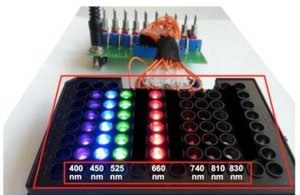Using low-power light to reduce infection risk and increase tissue repair after injury
Case study from the University of Birmingham who pitched their ideas to industry and investors at the CDE Marketplace on 27 April 2016.

Novel light array system for high-throughput screening of cell cultures to allow effective discrimination of therapeutic effects.
Researchers at the University of Birmingham have been funded by the Centre for Defence Enterprise (CDE) to develop unique military medical tools that could be used on the battlefield, in a field hospital or for rehabilitation. The concept involves wound irradiation using low-power light to decontaminate and accelerate healing mechanisms after minor injuries, burns or even extensive trauma.
The University of Birmingham study has demonstrated fundamental principles associated with light therapy and tissue repair at a cellular and molecular level. The results demonstrate the potential to use novel therapeutic technologies to reduce the risk of infection and increase healing rates following injuries. This includes those sustained on the battlefield, as well as after surgical procedures.
Future application of this technology may improve clinical success rates and rehabilitate troops back to duty more quickly.
Dr Will Palin, Reader in Biomaterials, University of Birmingham says:
The funded CDE project has enabled us to work with relevant key stakeholders including military-related medical sciences, which is crucial for the development of our novel proposed technology.
View the pitch presentation slides.
About CDE
CDE funds novel, high-risk, high-potential-benefit research. We work with the broadest possible range of science and technology providers, including academia and small companies, to develop cost-effective capabilities for UK armed forces and national security.
CDE is part of Dstl.
Centre for Defence Enterprise
Building R103
Fermi Avenue
Harwell Oxford
Oxfordshire
OX11 0QX
Please email for the quickest response.